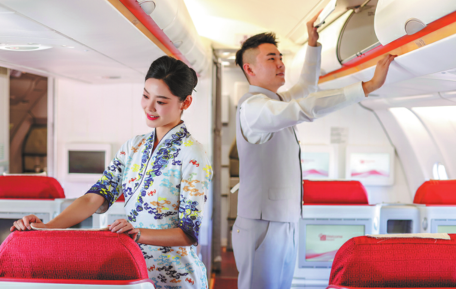Access selected deals available with budget and full-service airlines
Lock any airfare that sounds great. You don’t lose anything if you cancel it
Call us anytime for any assistance. We do not go into hibernation
Your personal and financial information stays secure with us
Tianjin Airlines, a Chinese regional airline and subsidiary of HNA Group, was founded in 2004 as Grand China Express Air and rebranded in 2009. Headquartered at Tianjin Binhai International Airport (TSN), it operates a fleet of 104 aircraft, primarily Airbus A320s, A330s, and Embraer E190s, serving over 290 domestic and international routes to 126 cities. With hubs in Tianjin, Xi’an, Hohhot, Urumqi, Chongqing, Guiyang, Haikou, and Dalian, the airline focuses on regional connectivity, particularly in Xinjiang and Inner Mongolia, and offers long-haul flights to destinations like London, Auckland, and Moscow. Known for affordable fares and a 3-Star Skytrax rating, Tianjin Airlines emphasizes safety, with over 1.8 million safe flight hours, and earned accolades like “Best Regional Airline in China” in 2011. However, it faces criticism for limited English-language services, poor inflight entertainment, and customer service delays. As of 2025, Tianjin continues to expand its network and modernize its fleet, aiming to enhance passenger experience and operational efficiency.

Tianjin Airlines was established in 2004 as Grand China Express Air, a consolidation of HNA Group’s aviation assets, including Hainan Airlines, China Xinhua Airlines, Changan Airlines, and Shanxi Airlines. It received its operating license from the Civil Aviation Administration of China (CAAC) in 2007 and launched scheduled flights using 29–32-seat Fairchild Dornier 328JET aircraft, becoming China’s largest regional airline with 78 routes linking 54 cities. On June 10, 2009, it rebranded as Tianjin Airlines, reflecting its Tianjin base and partnership with the Tianjin Municipal People’s Government.
By August 2011, Tianjin Airlines served 63 destinations independently, with ambitions to operate over 450 routes by 2012, capturing 90% of China’s regional aviation market. In 2015, it signed a contract for 22 Embraer aircraft (20 E195s, 2 E190-E2s), part of a 2014 agreement for 40 aircraft, with deliveries starting in 2015. Long-haul expansion began in 2016 with Airbus A330-200s, launching flights to Auckland, London Gatwick (shifted to Heathrow in 2018), and Moscow-Sheremetyevo.
A notable incident occurred on June 29, 2012, when six ethnic Uyghur men attempted to hijack Tianjin Airlines Flight 7554, an Embraer E190. Passengers and crew subdued the hijackers, and the aircraft safely returned to Hotan, with 11 passengers, crew, and two hijackers treated for injuries. In 2011, Tianjin Airlines passed the IATA Operational Safety Audit (IOSA) and joined IATA, reinforcing its safety credentials. As of 2025, the airline continues to grow, with plans for new routes and fleet modernization, including potential Airbus A350 additions.
As of April 2019, Tianjin Airlines operates a fleet of 104 aircraft, including Airbus A330-200s (long-haul, 260 seats), A320-200s (medium-haul, 180 seats), Embraer E190s (regional, 106 seats), and ERJ145s (50 seats), with an average age of approximately 8 years. The A330s feature a 2-2-2 Business Class and 3-3-3 Economy layout, while A320s and E190s offer Economy and limited Business configurations. The fleet supports a network covering China, Japan, South Korea, Russia, the UK, New Zealand, and Australia, with plans to introduce A350s for long-haul routes like Los Angeles and Madrid by 2027.
Sustainability efforts focus on fuel-efficient aircraft like the A320neo and E190-E2, reducing emissions by up to 15% compared to older models. The airline optimizes aircraft utilization to enhance efficiency and minimize environmental impact. Cargo services, integrated with HNA Group’s logistics, support economic sustainability by connecting regional markets. Tianjin Airlines’ young fleet and operational strategies align with China’s push for greener aviation, though specific sustainability programs are limited.